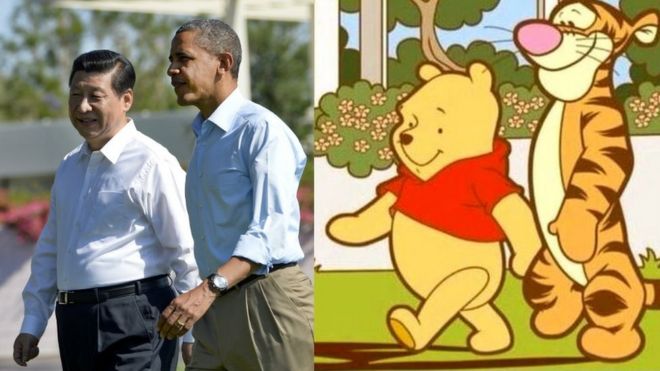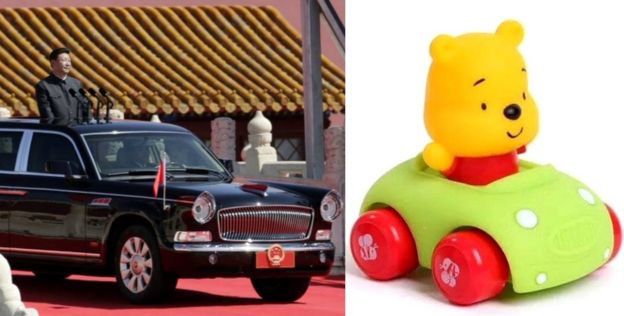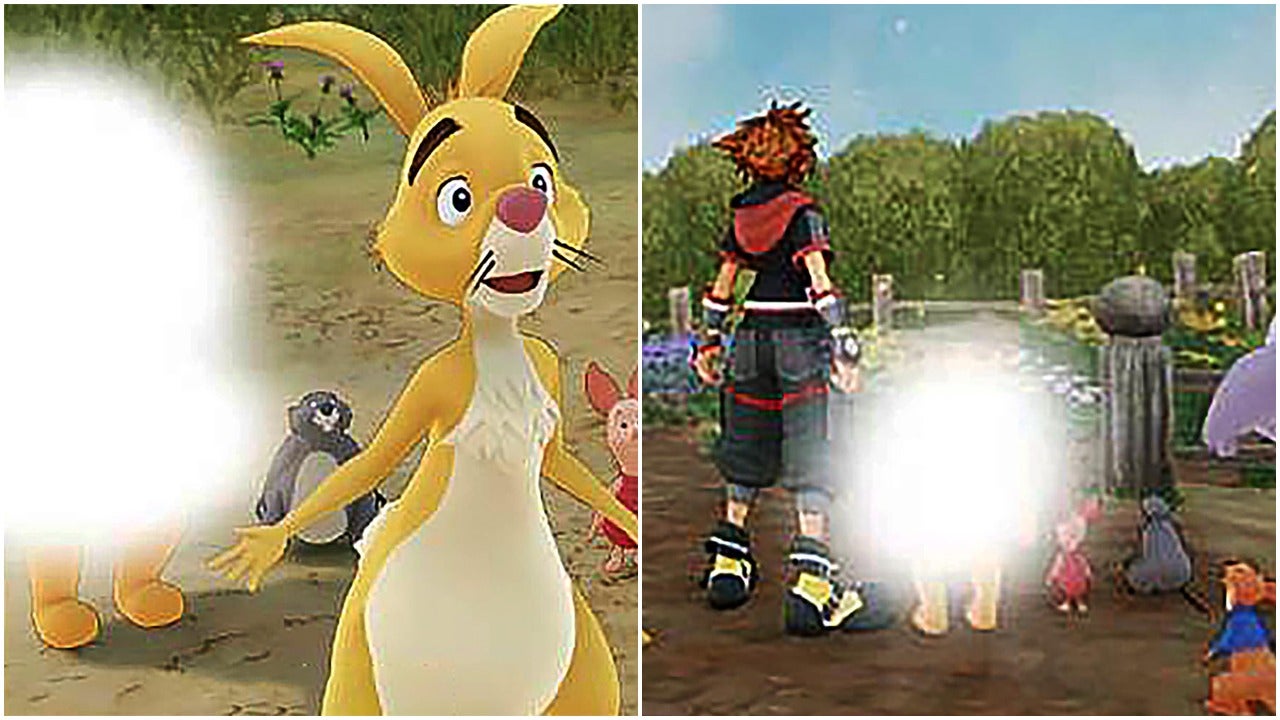As you may have heard from shows like South Park or John Oliver, Winnie the Pooh is banned in China because that lovable ol’ bear seems to resemble Chinese president Xi Jinping.

Well, if anything, it’s more of a passing resemblance, but images like the one above pissed off the authoritarian Chinese leader so much that measures were taken to censor that chubby little cubby all stuffed with fluff starting in 2015. Much like certain words have been banned online in China, so too has Pooh Bear become the target of Chinese internet censors. Unsurprisingly, the ban only served to bring more attention to the images, spawning even more of them.

“He’s propagating the issue, and frankly, I think he’s humiliated himself by being so childish about it,” says Deb Hoffmann, who holds the world record for the largest collection of Winnie the Pooh memorabilia. “If he would’ve just let it go, it would have died down by now. Plus, if the idiot knew anything, he would be delighted to be compared to Winnie the Pooh. After all, Winnie the Pooh is a very good-hearted, wonderful, thoughtful person. Being compared to Winnie the Pooh is actually quite the compliment!”
Still, exactly how widespread this ban is somewhat unclear. Are Chinese officials burning books by A.A. Milne and tearing the stuffing from plush Pooh dolls? I mean, what exactly is going on over there?
One of the major news stories that brought the Pooh ban to the attention of Americans was when China decided not to screen the 2018 film Christopher Robin, starring Ewan McGregor. While many here in America cited China’s censorship as the reason, China offered no official explanation. Defenders have claimed, though, that the reason for the omission had nothing to do with Xi Jinping: Instead, they cited the fact that China has a limit to the number of American films it releases — just 34 films per year — and while China’s desire to censor Pooh may have played a part in this, the claim that it was due to the limit on imported films may have some credibility — after all, Christopher Robin didn’t do all that well as a film. Here in America, it was only the 36th highest grossing film of 2018, and it underperformed at the box office. Additionally, the previous Winnie the Pooh theatrical film — 2011’s Winnie the Pooh — also didn’t screen in China, and that was well before the controversy, and before Xi came to power.
Merchandise for Christopher Robin was still made in China, however, so it’s hardly like the “ban” affects China making a buck in its factories. The same goes for Pooh merch not affiliated with the film — you can buy lots of Winnie the Pooh products from China and have them shipped to America. Even in China itself, Pooh merchandise is still available for purchase: Shanghai’s Disney Store — the largest Disney Store in the world! — has Pooh Bear merchandise available for sale, and features some Pooh items in the background of this video from its opening.
Admittedly, this video is from 2015 — during the early days of the Pooh debacle — so while the ban could have gotten harsher since the opening, more recent Instagram posts from the store show Pooh merch is still for sale.
Books about Winnie the Pooh are also still available for purchase in China, and works by creator A.A. Milne are available in the Beijing National Library, including a 2006 print of Winnie the Pooh’s original stories. As for television, I found nothing saying that he’s been pulled from TV screens over there, so it’s reasonable to assume he still runs on China’s version of Disney Junior, just like he does all around the world.
Additionally, there have been online rumors that China is going to dismantle its Winnie the Pooh rides at Shanghai’s Disney resort, including the “Hunny Pot Spin” and “The Many Adventures of Winnie the Pooh.” For clarification, I reached out to Disney’s vacation-planning live chat, where a representative labeled as “张汝林” told me to “Please kindly note Winnie the Pooh is still on duty now.” They also reassured me that Pooh merchandise is still available for sale and that Pooh still partakes in character meet and greets in the park. I also found a recent Instagram post showing mascot Pooh in action.
So, if I can continue to put my ass into a Pooh-themed honey pot in China’s largest city, is the so-called “Winnie the Pooh ban” even real?
Indeed it is, though the censorship of Pooh is more of a targeted assault on free speech than an outright ban on a lovable children’s character. Social media is the big one, as Pooh images have been pulled off platforms there, including images that mock Xi and sometimes even ones that don’t (though the latter of which seems to be less common).
So, we did find some seemingly a-political pooh talk blocked on Weibo… over-inclusiveness in trying to block the meme, I suspect and not exactly a real Winnie Ban, but more than I thought was out there! https://t.co/AEGO4SOTjt
— China Law Translate / Jeremy Daum (@ChinaLawTransl8) October 10, 2019
In addition to social media postings and Christopher Robin — which, objectively, may not even be part of the ban — the only other solid reporting on the Winnie the Pooh ban was in a video game, specifically 2018’s Kingdom Hearts III. The popular Disney game features characters from a multitude of Disney properties — Pooh included — and when it was released, the Chinese version was altered to blur Winnie the Pooh. Curiously, the way Pooh was omitted saw him replaced by a white glowing orb, yet his distinctive legs were still visible, so players could still interact with Pooh, they just couldn’t see his face.

The Kingdom Hearts example possibly marks the first time that Pooh was intentionally blocked separately from an image mocking Xi. All previous pulls seem to be primarily in the context of protecting the image of their leader, but Kingdom Hearts represents new territory. Indeed, this seems to confirm that the Pooh ban isn’t only about removing embarrassing comparisons to Xi, but also silencing a certain element of the Chinese population: Between the game and social media, the demographic being targeted is clearly the teens and young adults who may play video games and spend a lot of time online.
Because of this intentional targeting of China’s young people — as well as Xi’s thin skin — Winnie the Pooh has become a part of China’s youth resistance, along with beloved British cartoon character Peppa Pig, who was banned a few years ago when supposed “gangsters” began getting ironic tattoos of her. The pair have become symbols of China’s disgruntled youth, with crowds having been seen taunting Xi by wearing Pooh masks at rallies protesting China’s treatment of Hong Kong.
![]()
So while China’s Pooh ban isn’t quite an all-out deportation of the lovable yellow bear, if Kingdom Hearts is any indication — and if the Pooh-mask-wearing Chinese youth piss of their president enough — China’s ban on that lovable fluff ball may indeed tighten. Censoring free speech is essential to Xi’s grip on power, and it’s clear that he has no intention to just grin and, well, bear it.

